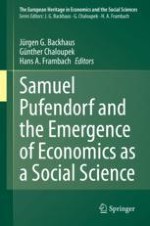2021 | OriginalPaper | Chapter
How to Shape Societies: Pufendorf on Organizing Individual Interests and Social Interaction
Author : Hans A. Frambach
Published in: Samuel Pufendorf and the Emergence of Economics as a Social Science
Publisher: Springer International Publishing
Activate our intelligent search to find suitable subject content or patents.
Select sections of text to find matching patents with Artificial Intelligence. powered by
Select sections of text to find additional relevant content using AI-assisted search. powered by
